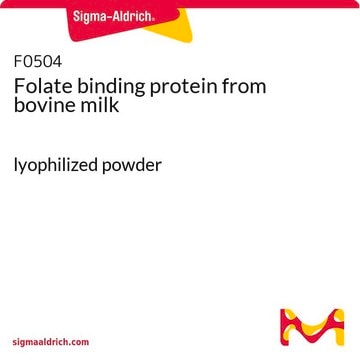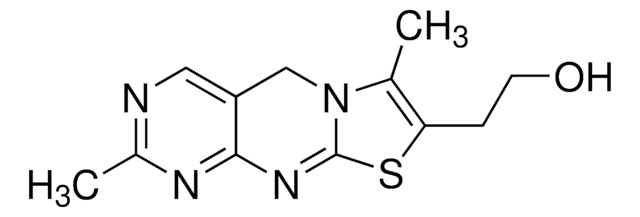P1781
Pteroic acid
≥93%
Synonym(s):
4-{[(2-Amino-4-hydroxypteridin-6-yl)methyl]amino}benzoic acid
Sign Into View Organizational & Contract Pricing
All Photos(1)
About This Item
Empirical Formula (Hill Notation):
C14H12N6O3
CAS Number:
Molecular Weight:
312.28
MDL number:
UNSPSC Code:
12352100
PubChem Substance ID:
NACRES:
NA.22
Recommended Products
Quality Level
Assay
≥93%
form
powder
SMILES string
NC1=NC(=O)C2=NC(CNc3ccc(cc3)C(O)=O)=CNC2=N1
InChI
1S/C14H12N6O3/c15-14-19-11-10(12(21)20-14)18-9(6-17-11)5-16-8-3-1-7(2-4-8)13(22)23/h1-4,6,16H,5H2,(H,22,23)(H3,15,17,19,20,21)
InChI key
JOAQINSXLLMRCV-UHFFFAOYSA-N
Looking for similar products? Visit Product Comparison Guide
Application
Pteroic acid can be used as a starting material to synthesize labeled folate binding protein (FBP) ligands, which are used in many homogeneous chemiluminescent assay formats for the detection of folic acid.
Storage Class Code
11 - Combustible Solids
WGK
WGK 3
Flash Point(F)
Not applicable
Flash Point(C)
Not applicable
Personal Protective Equipment
dust mask type N95 (US), Eyeshields, Gloves
Choose from one of the most recent versions:
Already Own This Product?
Find documentation for the products that you have recently purchased in the Document Library.
Customers Also Viewed
Preparation and purification of pteroic acid from pteroylglutamic acid (folic acid).
J M Scott
Methods in enzymology, 66, 657-660 (1980-01-01)
Synthesis of pteroylglutamic acid (liver L. casei factor) and pteroic acid.
M E HULTQUIST et al.
Journal of the American Chemical Society, 70(1), 23-23 (1948-01-01)
Synthesis of pteroylglutamic acid (liver L. casei factor) and pteroic acid.
C W WALLER et al.
Journal of the American Chemical Society, 70(1), 19-22 (1948-01-01)
X Yan et al.
Journal of molecular biology, 266(5), 1043-1049 (1997-03-14)
Ricin is a potent cytotoxin which has been used widely in the construction of therapeutic agents such as immunotoxins. Recently it has been used by governments and underground groups as a poison. There is interest in identifying and designing effective
Sumith A Kularatne et al.
Methods in molecular biology (Clifton, N.J.), 624, 249-265 (2010-03-11)
Nanoparticulate medicines offer the advantage of allowing delivery of large quantities of unmodified drug within the same particle. Nanoparticle uptake by cancer cells can, however, be compromised due to the large size and hydrophilicity of the particle. To circumvent cell
Our team of scientists has experience in all areas of research including Life Science, Material Science, Chemical Synthesis, Chromatography, Analytical and many others.
Contact Technical Service












